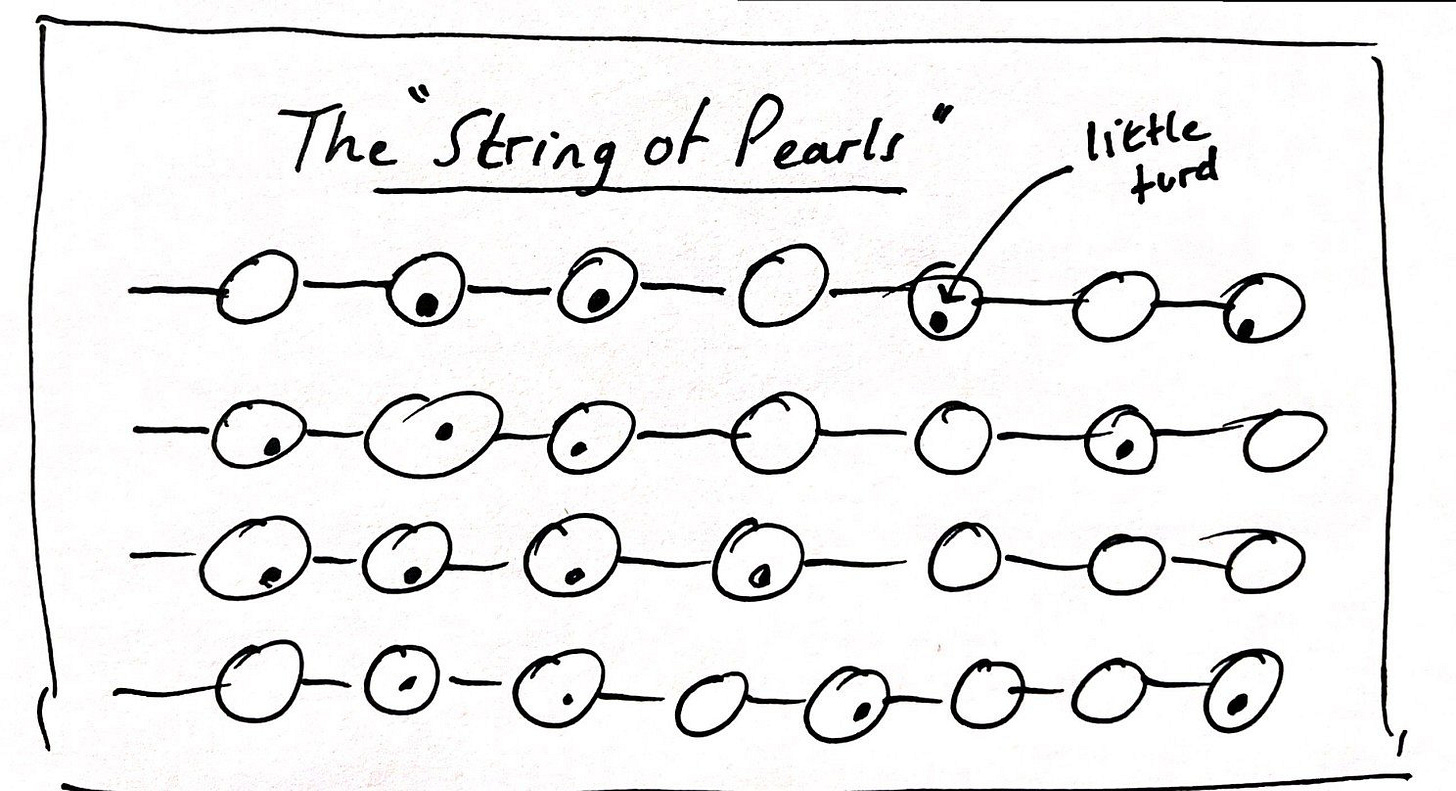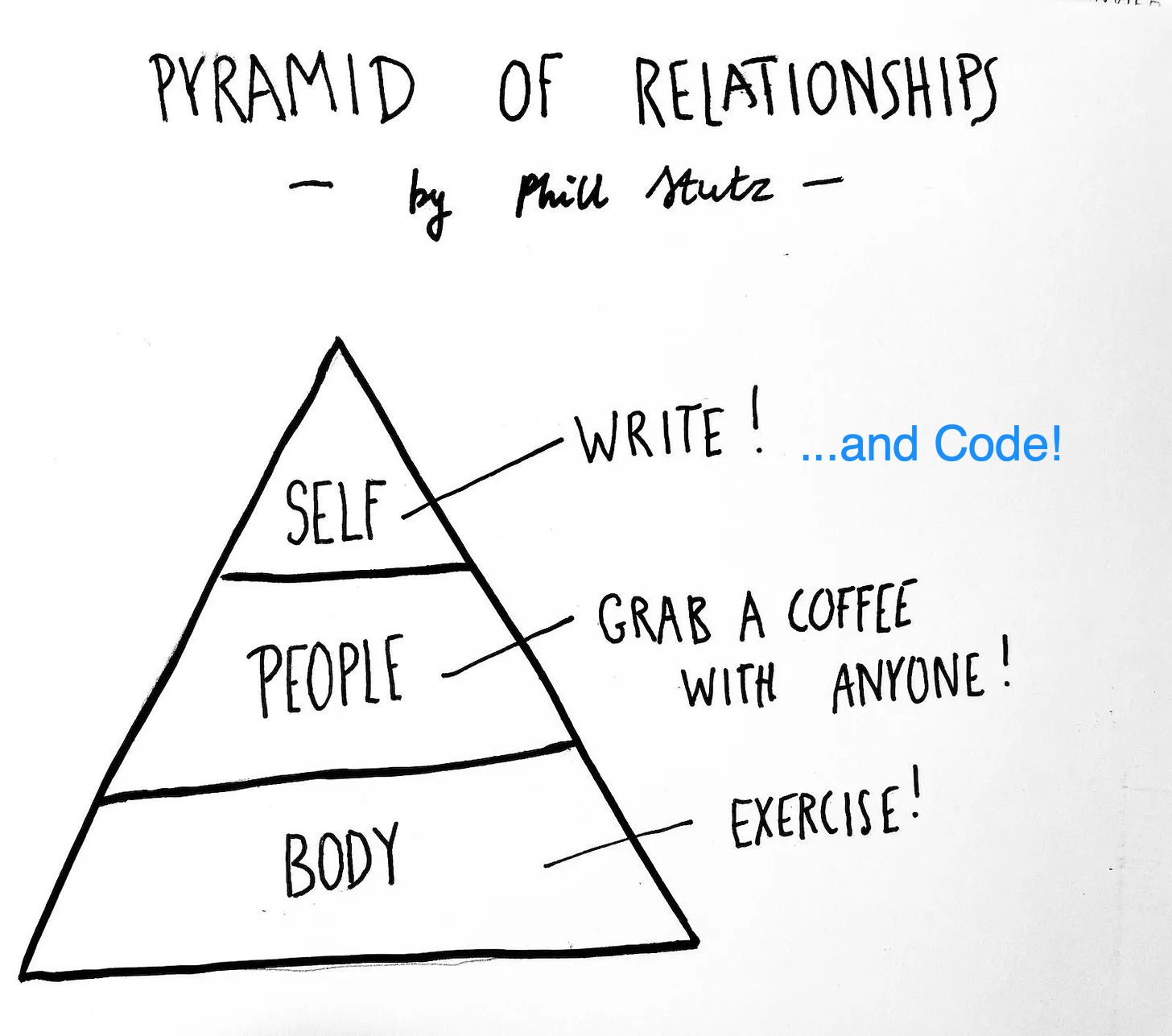A few months ago I watched Stutz, a documentary by Jonah Hill in which he interviews his therapist, Phil Stutz. It’s good. Watch it. Here are some of the major takeaways for me.
There are three constant features to life
Pain
Uncertainty
Constant work
Everyone experiences these three things. Warren Buffet, Taylor Swift, Joe Biden, Pope Francis — all of them face these three things. They are the brute facts of life.
Sounds rather Hobbesian.
However, there is happiness to be found. It comes in not in avoidance but in working through these things. Every single day.
Alongside them are some other, ever-present aspects that color our experiences.
The Life Force
Simple stated, your Life Force is what gets out of bed to do things in the world, the “things” ranging from deep “flow” work like programming or walking your dog. It is with you until the day you die. When your life force is diminished — because of illness, depression, addiction — everything else is diminished too.
Phil’s main recommendation for this is exercise and living a healthy lifestyle. Easier said than done, of course, but there’s really no substitute for good, clean living.
The Snapshot
The snapshot is the vivid, idealized version of you in your head, often a picture in the mind’s eye. If you’re an actor, maybe it’s being on stage at the Academy Awards accepting the Oscar. If you’re a startup founder, maybe it’s ringing the opening bell of the New York Stock Exchange. If you’re a writer, it might be winning a major award. A scientist might envision being on stage accepting the Nobel Prize.
Dreams like this can be motivational, but fundamentally they are just a snapshot of a moment in time. They don’t capture the struggle of auditioning for roles, or kissing the ass of a key customer, or having yet another experiment fail, or telling your child you can’t make it to the soccer game this Saturday because the web site has been hacked.
Nor do they capture the moments — the years — after the snapshot. It doesn’t show you being the “star” of a bomb movie, or having to fire an employee, or doing a bad job with a customer, or the many, many failures you confront every day in your personal work habits, your business and personal relationships, wrestling with your personal demons.
So while the snapshot might be a nice fantasy, it’s absolutely crucial to realize that it doesn’t exist, and it never will exist. The moment you reach it, you will find yourself thinking, “now what?”
Part X
Part X is your shadow, the villain who wants to hold you back. It’s the part of you that engages in negative self-talk, self-sabotage, feelings of guilt and shame. It is always with you. Always.
I used to have a lot of trouble with negative self-talk until I found a technique that helped a lot. A lot. And it’s really simple, a cognitive behavioral therapy technique that you can start doing right now.
I started wearing a rubber band on my wrist. Every time I caught myself thinking negatively about myself, I simply snapped the band. This simple act interrupts the thought loop and made me realize that I was stuck in my head. After literally snapping out of it, I simply redirected my thoughts to something else.
Note: I didn’t try to redirect to “positive thinking” or give myself a bunch of affirmations. I simply thought of something else — what to make for dinner, what’s on TV, how’s the weather — anything besides negative self talk.
For the first week or so I found myself with a very sore wrist from all the snapping! But over time it happened less and less, and eventually I learned to quickly recognize and redirect negative thoughts. I still get negative thoughts and impulses, but I generally don’t linger on them. If I found myself doing that, I would just start using the rubber band trick again, something I’ve done off and on for more than a decade.
You may be thinking, “what if someone asks about the rubber band? Isn’t that a little weird?” I worried about that too at first, but it turned out to be a great conversation starter. When I told people I used it to stop negative thinking, they universally loved it. Because everyone experiences negative self talk! This is the pain and uncertainty that Phil Stutz talks about — a universal feature of life.
The String of Pearls
Stutz describes life as a series of pearls. Some are big, others very small, but with each one there is completion. Getting out bed, showering and getting dressed is a pearl. Making it to your desk and starting work is a pearl. Shipping code to production, closing a customer, completing a module to an online course — all pearls. And as we work through life’s Constant Work, we are stringing these pearls together.
Here’s the thing. Inside every one of these pearls is a little turd - the thing that nags at you afterward. This is true of everyone. Everyone. Stephen Spielberg has little turds in his movies. Steve Jobs had little turds in his product announcements. Michael Jordan had little turds in every one of his games. You and I might now know about them, but they’re there
This very piece of writing is one of my pearls, and as I write it I’m seeing lots of little turds. I’m thinking about how I struggle to make one idea follow another. I’m thinking how guilty I feel for not walking my dog this morning because I woke up late. I’m thinking this whole enterprise of writing might just be one big turd.
Of course, that’s just Part X talking!
For the longest time I had a bit of a self-deprecating approach to conversations. I remember once talking to someone at a bar and when they asked what I did, being almost embarrassed to say I was an entrepreneur. On one hand, I wanted to be proud of myself because I had always looked up to successful entrepreneurs, and I had personally achieved some things.
On the other, I felt like my accomplishments had more to do with luck than my own work, or that they were no big deal compared to others, that anyone could do it if they wanted to, that I I was playacting as Steve Jobs when the capital “t” Truth is I am closer to Elizabeth Holmes.
That’s because I could see the turds inside, the little pieces of crud underneath — the really ugly spaghetti code in that one section of the app, the unhappy customer who yelled at me, the time I lashed out an employee when I was in a bad mood.
The Relationship Pyramid
Stutz has something he calls the Relationship Pyramid, which boils down to this: take care of — and make friends with — yourself. Take care of your body, nurture your personal relationships, and self actualize through writing.
For me, coding is almost like writing because in the sense that I’m forced to confront my shortcomings and bad intuitions. I’m most alive when I’m fully immersed in the struggle of making something work.
I expect to continue writing code until the day I die.
Maybe you will too?







I write for the NYTimes, WaPo, and various other places that have comments.
I don't do social media. I assume that no one will ever read these comments.
You have a dog, but no family? I'm 83 and have two half-dogs and one sixth of a cat.
My wife and I are simpatico. I have a t-shirt that says "I fix things and I know stuff."
My 50-ish son is an auto-didact OTR trucker who knows things, and fixes stuff, like
my fathers before me..
ormond@mail.com